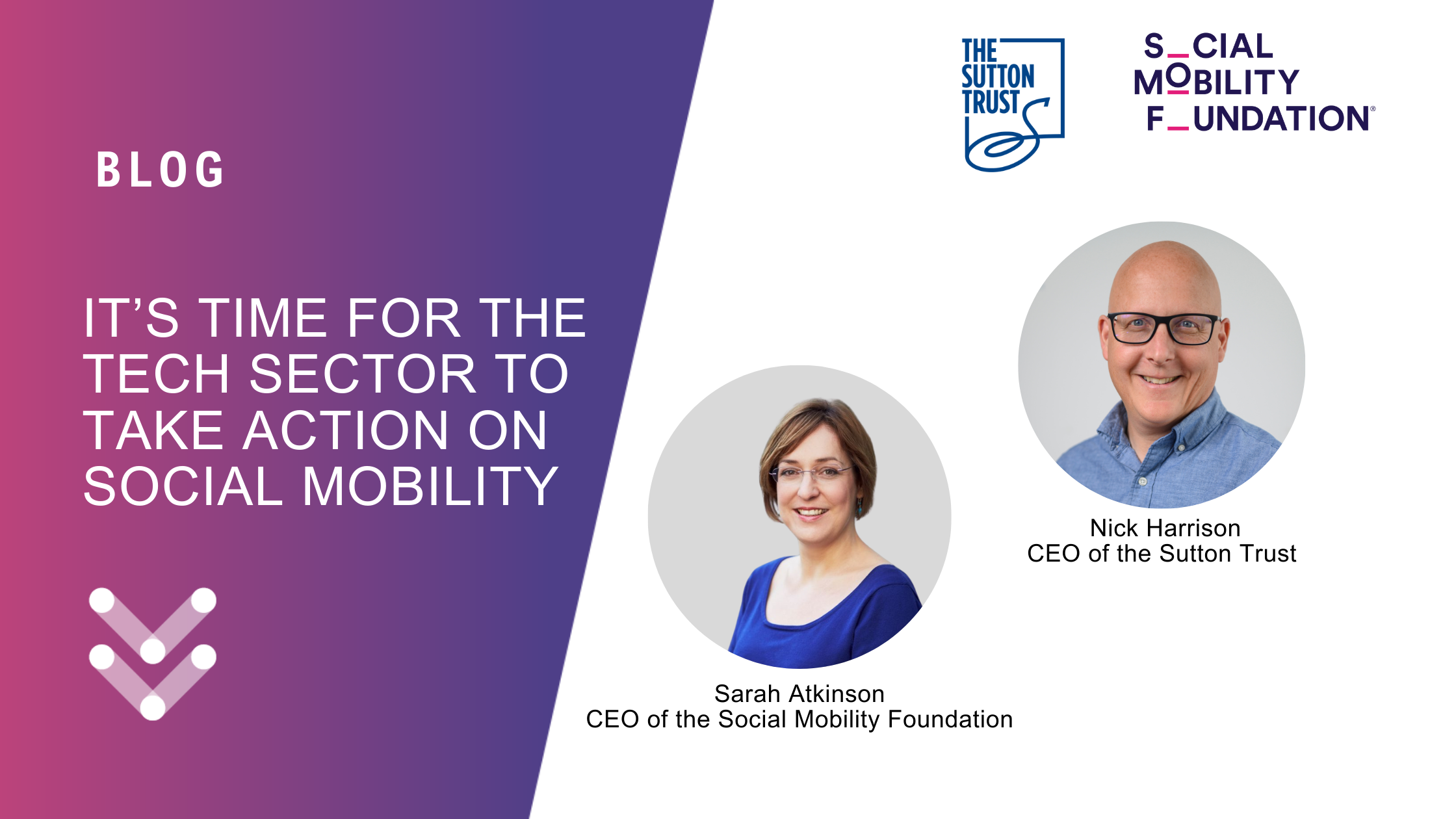It’s time for the tech sector to take action on social mobility

The Tech Talent Charter’s recent report on diversity in the tech sector should be a wake-up call to the whole industry. With lower levels of socio-economic diversity than professions such as law and finance, tech is elitist. As two organisations passionate about the benefits of social mobility for individuals, the economy and society, the Sutton Trust and the Social Mobility Foundation are calling on the tech sector to up its game. The workplace is as important as the classroom in creating social mobility and given tech is such a fast-moving and innovative industry, this is a solvable problem if employers commit to change!
Along with the staggering statistic that only 9% of tech workers surveyed come from a low socio-economic background (compared with 39% of the general workforce) the report also highlights a persistent talent gap in the tech industry. Focussing on socio-economic diversity is a no-brainer for employers, helping them to fill an ever-increasing skills shortage with a wealth of untapped talent. And as pay in the sector is 64% higher than the average, the tech sector has the potential to be a powerful vehicle for social mobility.
Improving social mobility in tech is a moral and economic imperative
This is not just a moral argument, but an economic one. Increased socio-economic diversity brings a wealth of perspectives and ideas, fostering innovation and creativity. Diverse teams have been proven to outperform their homogeneous counterparts, emphasising the business case for inclusivity.
It is not only in the diversity of its workforce that tech is outperformed by traditionally ‘elite’ sectors such as law and finance. Tech companies are also significantly underrepresented in initiatives like the Social Mobility Foundation’s Social Mobility Employer Index, an annual benchmarking and assessment tool for employers. This measures how organisations perform on eight areas of employer-led social mobility and offers each employer that enters bespoke advice and guidance on best practice. Technology, software and computing made up only 4% of Index entrants in 2023, with sectors such as Law and Banking, Finance and Insurance accounting for over half of the entrants last year.
Understanding the barriers to tech careers
Barriers to entry into the tech industry are pervasive, spanning multiple stages of an individual's journey and continuing into their career progression. Inconsistencies in technical education, a shortage of qualified teachers, and a lack of access to equipment for students from low-income families create significant challenges at school and in higher education.
A lack of understanding of the industry among young people and their parents and widespread misconceptions, like believing that tech roles always require hard technical skills such as programming, discourage many disadvantaged young people from aspiring to a career in tech. Pathways into the industry and the range of roles available often appear broad and unclear, further complicating the decision-making process. There’s also a lack of sufficient role models for working-class young people, who may also lack family and social connections within the tech sector.
And there are further hurdles to overcome for those who do enter the tech workforce. Outdated hiring practices that prioritise qualifications over competence perpetuate inequalities, demanding educational credentials that may be irrelevant to job requirements. There can be a lack of transparent and accessible progression routes within the industry, making navigating and negotiating career advancement challenging.
All these barriers, both in the educational pipeline and the workplace, underscore the urgent need for targeted initiatives that dismantle systemic obstacles and pave the way for greater social mobility within the tech sector.
Taking steps to improve social mobility in tech
The first step in addressing this gap is giving it the attention, commitment, and funding it deserves – 47% of companies surveyed were not focused on socio-economic background, meaning they have no initiatives to monitor or improve socio-economic diversity. This must change. Employers should start collecting data and taking action to counter the multiple barriers faced by people from low socio-economic backgrounds, in terms of access to the industry and in-work progression. Tech Talent Charter’s report reveals that only 23% of signatories are currently doing so. Anyone who wants to find out more about the Social Mobility Foundation’s Employer Index can register here.
Employers can also benefit from the launch of the Sutton Trust’s Tech Task Force on Social Mobility, which aims to bring together organisations already on their social mobility journey and those just starting out. We know that pockets of progress are already underway, so this task force will provide a space for organisations to share knowledge and best practice and learn from each other and the Trust’s experts. We will look at everything that can impact social mobility – from collecting data, to interview practices, to attracting diverse talent – nothing will be off the table. You can find out more by joining our launch webinar, taking place on 4th April at 2pm.
And for employers looking for detailed advice on how they can enact change in advance of the webinar, the Sutton Trust has its Social Mobility in the Workplace: An Employer’s Guide. This is aimed both at those taking their first steps to improve socio-economic diversity in their workforce, as well as giving practical tips and guidance for those who are already further along. It covers a wide range of issues, from how to measure the socio-economic make-up of your workforce, through to contextual recruitment and best practice advice on routes into the workplace for young people, including internships and apprenticeships.
Cross-industry effort and determination is needed to turn the dial on inequality. Companies do not need to take this challenge on alone: The Sutton Trust and Social Mobility Foundation offer targeted support on this journey.
The Sutton Trust and the Social Mobility Foundation are both Signatories of the Tech Talent Charter. Find out more about how your organisation can participate in our cross-industry collaboration on inclusion here.